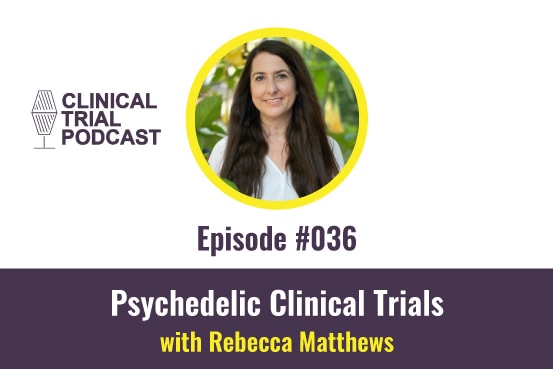My guest for this interview is Rebecca Matthews, Chief Clinical Operations Officer at Multidisciplinary Association for Psychedelic Studies (MAPS) Public Benefit Corporation.
In this interview, Rebecca shares with us what it takes to conduct clinical trials investigating the use of MDMA, a psychedelic drug, in conjunction with psychotherapy to treat patients with post traumatic stress disorder (PTSD).
PTSD can occur after a person experiences a significant trauma, like a sexual assault, severe physical assault, significant threat to life arising from a hate crime, natural disaster, war, or accident. It affects people of all races, ages, and backgrounds.
As you’ll hear from Rebecca shortly, the clinical data from the recent clinical trial looks extremely promising.
This interview will leave you with excellent insights on differences and challenges of conducting research with psychedelic drugs including site selection, patient recruitment, clinical trial design considerations and more.
I am beyond excited to discuss this important topic of psychedelic research on the podcast.
Please join me in welcoming Rebecca Matthews on the Clinical Trial Podcast. Enjoy!
Sponsor
Florence Healthcare: Transform your Clinical Trials with the #1 Platform for Electronic Document Workflows and Remote Site Access.
Learn how Florence Healthcare helps over 7,200 research sites, sponsors, and CROs across 27 countries take their day back from paper.
[3:27] There are different psychedelic drugs such as psilocybin, ketamine, ibogaine, ayahuasca. MAPS is focused on MDMA for PTSD and cannabis for treating symptoms of PTSD
Show Notes
Correction: Phase II Clinical Trial Data
In MAPS’ completed Phase 2 trials with 107 participants, 61% no longer qualified for PTSD after three sessions of MDMA-assisted therapy two months following treatment. At the 12-month follow-up, 68% no longer had PTSD. All participants had chronic, treatment-resistant PTSD, and had suffered from PTSD for an average of 17.8 years.
[4:38] State of Colorado and Michigan supporting clinical research in the psychedelic space
[4:54] Brief history of psychedelic drugs and what led FDA to support MDMA research via Breakthrough Therapy Designation and Special Protocol Assessment
[8:05] Current status of MAPS Benefit Corporation MDMA studies including data from phase II studies
[9:19] Why Sponsors are not too keen on securing Breakthrough Therapy designation
[11:49] Why are for-profit companies not interested in MDMA?
[13:05] Clinical trial design considerations including diversity in patient population, diversity in therapist, clinical trial sites, access to care, educators, community acceptance,and public perception
[14:14] Additional consideration for acceptance of MDMA:
- Who does it work for?
- How long does the effect work?
- How does it affect the health care system?
- How does it affect you in your life?
- How does it affect you in your life and being able to go to work or go to school?
- Will insurers want to have this on their policies?
- Will companies want to support it?
[14:54] Community acceptance of MDMA
[16:10] Follow-up schedule for MDMA therapy
[16:46] Opportunities with MDMA therapy training program
[18:30] Clinical trial facility needs to be conducive with the MDMA assisted therapy
[19:54] Site and therapist selection
[20:47] Obtaining Drug Enforcement Administration Schedule I license ( storage, paperwork, scheduling DEA inspections, drug locked in the cabinet, alarm report, unannounced inspector visits)
[23:12] Training and scholarship program
[24:58] Patient recruitment challenges and opportunities
- PTSD recruitment website with screening questions for subjects → sites
- Participants live far away from the site
- Participants do not have qualifying trauma
- Health conditions/ comorbidities
[26:25] Enrollment rate and importance of participant diversity
[27:59] How to increase enrollment?
- Staff at MAPS Public Benefit organization
- Staff at sites
- People being trained or reached out to
- Involvement at conferences
[30:07] Compassionate Use and Expanded Access Program
- Sites in different areas – expanded site access
- Train clinics
- Train therapist
[31:10] What is Clinician-Administered PTSD Scale for DSM-5 (CAPS-5)?
[33:10] Stakeholders at the site include the study coordinator, therapist, and physicians (MDs)
[35:25] How DEA, FDA, and MAPS Public Benefit Corporation (Sponsor) work together?
[39:23] Central IRB (fast but expensive) versus local IRB (low cost/ free but slow)
[39:57] Patient centric activities (welcoming office, therapist comes ahead of time, plants/ flowers, clean, not loud, feels protected, without outside distractions)
[41:46] MAPS Public Benefit Corporation – Investigator Initiated Studies (ISS)
- Funding
- Protocol
- Team
- Clinic
- Safety data and concerns
- Contracts
[43:22] Other indications for MDMA include eating disorders with anorexia and binge eating disorder
[44:59] Rebecca accidental entry into clinical research, the joy of being a clinical site monitor, and a powerful patient story
[52:09] CRA skills working on MDMA studies (experience, ICH, GCP, mission aligned, solution focused, dynamic, passionate, smart, excited)
[53:52] CRCs are doing more than data entry. They are site managers and keeping the site on track
Resources Mentioned
The early use of MDMA (‘Ecstasy’) in psychotherapy (1977–1985)
U.S. Food and Drug Administration
Breakthrough Therapy designation
Approved Risk Evaluation and Mitigation Strategies (REMS)
Drug Enforcement Administration (DEA)
Donate to MAPS nonprofit organization / 501(c)(3)
Clinician-Administered PTSD Scale for DSM-5 (CAPS-5)
MAPS on Facebook, Instagram, LinkedIn
MAPS Research (clinical trial data)
Acid Test: LSD, Ecstasy, and the Power to Heal by Tom Shroder
People Mentioned
Amy Emerson (CEO of MAPS Public Benefit Corporation)







